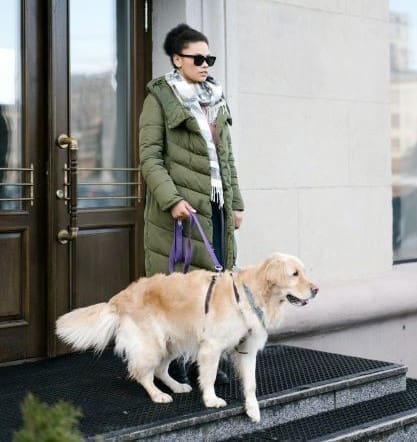A Blind Person’s Rights in Israel
Are you an Israeli who is blind or visually impaired? If so, it is important for you to be well acquainted with a blind person’s rights in Israel. The following article will list the main legal rights and entitlements that are available to you and explain how to access them. It is crucial that you know your legal rights as a person with a disability. Only then can you insist that your rights be upheld! Our law office specializes in liaising between private citizens and the authorities. If you need assistance related to disability rights in Israel or any other legal topic, please contact us: 03-3724722.

The essence of a blind person’s rights in Israel
Our society tends to construct itself primarily around the sense of sight and the visual experience, which can be very exclusionary to people with visual impairments. Therefore, there is a particular need for the State to support its blind residents who rely on their other senses. Additionally, people with blindness and visual impairments have added challenges and expenses that result from their disability. Therefore, the legislator has recognized several legal rights and protections for the blind residents of Israel. These include your rights to accessibility, equal opportunity, and economic security. The purpose of these protections is to guarantee that you are treated with fairness, equality, and dignity.
Who is classified as legally blind in Israel?
In Israel, in accordance with international standards, you are considered legally blind if at least one of the following criteria applies to you:
- If you have no ability to see whatsoever.
- If the vision in your strongest eye, after corrective measures such as glasses, is 3/60 or less. (In other words, if you have to be 3 meters away from an object in order to see it with the same level of clarity that a person with typical vision would see at a distance of 60 meters.)
- If the field of vision in your strongest eye is 20 degrees or less. (The visual field for each eye typically spans over 120 degrees horizontally and 90 degrees vertically.)
What is a certificate of blindness?
If at least one of the above criteria describes your visual disability, then you qualify for a certificate of blindness/visual impairment (teudat iver/lakui re’iya). The certificate is issued by the Ministry of Welfare and Social Services and it gives you access to a range of services and entitlements. There are two types of certificates of blindness: a permanent certificate and a temporary certificate. The type of certificate to which you are entitled is determined by your medical condition and whether or not your visual impairment might be treatable. The permanent certificate of blindness is valid in perpetuity. However, the temporary certificate has a date after which it requires renewal.
The benefits of having a certificate of blindness
The certificate grants its holder access to various rehabilitation services, exemptions, and discounts from both public and private entities. In order to qualify for the certificate of blindness, you must first be examined by a standard ophthalmologist. If the ophthalmologist determines that you fit one of the medical criteria mentioned above, then they will submit a request to have a certificate of blindness issued in your name. At the next stage, you will be summoned for an examination by a doctor at the Service for Sight, Hearing, and Technology (a branch of the Department of Disabilities within the Israeli Ministry of Welfare and Social Security). Based upon that examination, the Ministry of Welfare will determine whether you are entitled to a certificate of blindness.
How to appeal a denial
If your request for a certificate of blindness has been denied and you believe this to be an unjust ruling, then you can appeal the decision. The appeal should be submitted through a social worker at your local branch of the Department of Social Services within the Ministry of Welfare. The final ruling will then be given by a designated medical committee. Note that if you are visually impaired, but not to the extent that you qualify for a certificate of blindness, you may still be eligible for a general disability pension, a certificate of disability, and other entitlements.

Accessible parking permit for the blind
If you are visually impaired and have a certificate of blindness then you also have the right to receive a parking badge for a person with disabilities (tav chanaya laneche). If there is a vehicle that you regularly use for the purpose of being driven to different locations it can be added to the database of permitted vehicles. In order to request this permit send an application to the Ministry of Transport. The parking permit is a laminated badge that indicates that a particular vehicle is allowed to use reserved parking spots for disabled people. It also permits a driver to park their vehicle in any location that does not endanger anyone and that does not disrupt traffic, even if parking there is not normally permitted.
Economic rights of the blind in Israel
If you are completely blind, have a permanent certificate of blindness, and live in your own household, then you are also entitled to a monthly stipend for the blind/visually impaired. You are eligible for this entitlement only if you are completely or almost completely blind (i.e. if you have a visual acuity of less than 1/60 or a field of vision of fewer than 10 degrees). The current stipend (as of 2021) is 2,364 NIS a month. The purpose of the stipend is to ensure that blind citizens have full mobility and are able to pay for any necessary guiding services from a sighted person.
Note that a person cannot receive both this stipend and a mobility stipend for persons in wheelchairs, even if they otherwise qualify for both. Nor can a person who became blind after the age of 67 receive this stipend. However, it is important to clarify that this entitlement is in addition to the general disability pension to which a blind person is also entitled. Moreover, blind and visually impaired individuals are also entitled to a disability card and all the regular entitlements and discounts associated with that card. Individuals who have a certificate of blindness/visual impairment are also eligible for discounts at the post office, utility bills, national parks, and more. Moreover, a person with blindness (and their guide dog) may use public buses and trains for free.
Income tax exemption for the blind
A person who is legally recognized as blind is eligible for an exemption from paying income tax in Israel. However, there is a ceiling to how much income can be tax-exempt. Note that the ceiling is different depending on whether the income is from labor or from other sources. It is also possible to claim a tax rebate for up to 6 years if you had been blind in that period but not yet registered as such. Additionally, the parent of a blind child is entitled to pay a reduced income tax by 2 credit points (nekudot zikui) and the spouse of an unemployed blind person is entitled to pay a reduced income tax by 1 credit point.
Rights associated with guide dogs for the blind
The Service for the Blind within the Ministry of Welfare, along with partnering NGOs, aims to provide a specially trained guide dog to anyone who requires one. You may apply to receive a guide dog if you are a resident of Israel, have a certificate of blindness, would benefit from a guide dog, and are capable of caring for a dog. There is no charge for the guide dog nor for the month of training you would be given in order to work properly with the dog. Moreover, the State will also fully fund the upkeep of the guide dog. At the age of 10, your guide dog will be retired from service and you will be given a replacement dog. You may then either keep the former guide dog as a pet or give it back to the organization where the dog was trained.

A visually impaired individual who is assisted by a guide dog has the right to enter with their guide dog into any site or public transportation vehicle that serves the general public. This includes private sites with entrance fees and sites that do not otherwise allow dogs to enter. Moreover, the site is not allowed to charge a fee for the entrance of the guide dog. A person or organization that hinders a guide dog from entering a site is liable to a fine of 10,000 NIS. Additionally, even if a company does not otherwise allow dogs in the workplace, employers must accommodate the guide dog of a visually impaired employee. It is also strictly illegal to discriminate against a qualified candidate in the hiring process because of their blindness or use of a guide dog.
Other articles of interest
This article, “A Blind Person’s Rights in Israel”, covered some of the most prominent rights of people with visual impairments. You can find more information on the legal rights of people with disabilities on our website. You may be interested in articles such as Disability Rights in Israel – a Summary, How to Get a Disability Card in Israel, and Applying for an Accessible Parking Permit in Israel.
Contact us regarding a blind person’s rights in Israel
If you need help navigating the necessary procedures in order to receive all the entitlements that you deserve, please contact our law office. Also, feel free to contact us if you have any questions about this article or if you would like to gain a deeper understanding of a blind person’s rights in Israel.
מאמרים מומלצים

